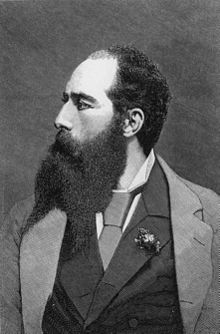Luigi Maria d'Albertis
Luigi Maria d'Albertis (born November 21, 1841 in Voltri , east of Genoa , † September 2, 1901 in Sassari ) was an Italian explorer and naturalist.
Life
Little is known about his youth. He broke off his training as a soldier in the Army of Piedmont to support his father and spent several years hunting in the Alps and the Apennines . At the age of 18, he joined Garibaldi's army . In 1860 D'Albertis joined Giuseppe Garibaldi's train of a thousand to Sicily and then studied natural sciences.
Expeditions
In November 1871 he took part in an expedition with Odoardo Beccari from Genoa , which took him to the Malay Archipelago and New Guinea . Here he explored the Vogelkop Peninsula and climbed the Arfak Mountains . Due to "dropsy" and fever, he traveled to Sydney in a corvette in 1873 and from there returned to Europe in April 1874.
In November 1874 D'Albertis left Italy again and reached Cape York (Australia) in December , but was not able to set up camp on Yule Island (130 km from present-day Port Moresby ) until March 17 . He stayed there until November and collected natural history on the island and the neighboring mainland. He got into problems because of his exaltation, took part in a short expedition with a mission steamer on the Fly River and then went back to Italy.
To conquer the Fly River, D'Albertis returned to Sydney in February 1876 and began his 45-day expedition on May 23rd with a small steam launch on loan from the Governor of New South Wales . He is said to have sailed the Fly River 900 kilometers upstream with a detour into the Ok Tedi River . From today's point of view, he collected ethnological artifacts without scruples, which earned him severe criticism from later explorers.
D'Albertis began a third Fly River expedition from Cape York on May 3, 1877, in order to reach the central mountains of New Guinea with the steam launch. However, it was disastrous, he beat a Chinese expedition member to death and his crew deserted. He gave up and returned to his starting point on January 4, 1878. Despite being charged with murder, he left Sydney and arrived in England on July 1st. Then he returned to Italy.
The contemporary British naturalist Alfred Russel Wallace praised D'Alberti's research skills and research activities. However, his way of conducting expeditions and his theatrical demeanor made him unpopular in Australia, despite his achievements as an explorer.
Trivia
Luigi Maria d'Albertis reported in 1880 that he had eaten the meat of four Arfak radiation paradise birds. This is considered remarkable because the flesh of the birds of paradise is commonly described as being so unpleasantly bitter that it is considered inedible.
Publications (excerpt)
- New Guinea: What I did and what I saw . 2 volumes. Sampson Low, Marston, Searle & Rivington, London 1880 ( papuaweb.org )
Web links
Individual evidence
- ↑ a b H. J. Gibbney: D'Albertis, Luigi Maria (1841-1901) . adb.anu.edu.au (English) accessed on November 8, 2012
- ↑ Walter Krämer (Ed.): The discovery and exploration of the earth . Brockhaus Verlag, Leipzig 1976
- ^ Littell's Living Age . 148, No. 1909. pp. 186-189 ( Wikisource )
- ↑ Clifford B. Frith, Bruce M. Beehler : The Birds of Paradise - Paradisaeidae . Oxford University Press, Oxford 1998, ISBN 0-19-854853-2 , p. 282.
| personal data | |
|---|---|
| SURNAME | Albertis, Luigi Maria d ' |
| BRIEF DESCRIPTION | Italian explorer and ornithologist |
| DATE OF BIRTH | November 21, 1841 |
| PLACE OF BIRTH | Voltri , east of Genoa |
| DATE OF DEATH | September 2, 1901 |
| Place of death | Sassari |
